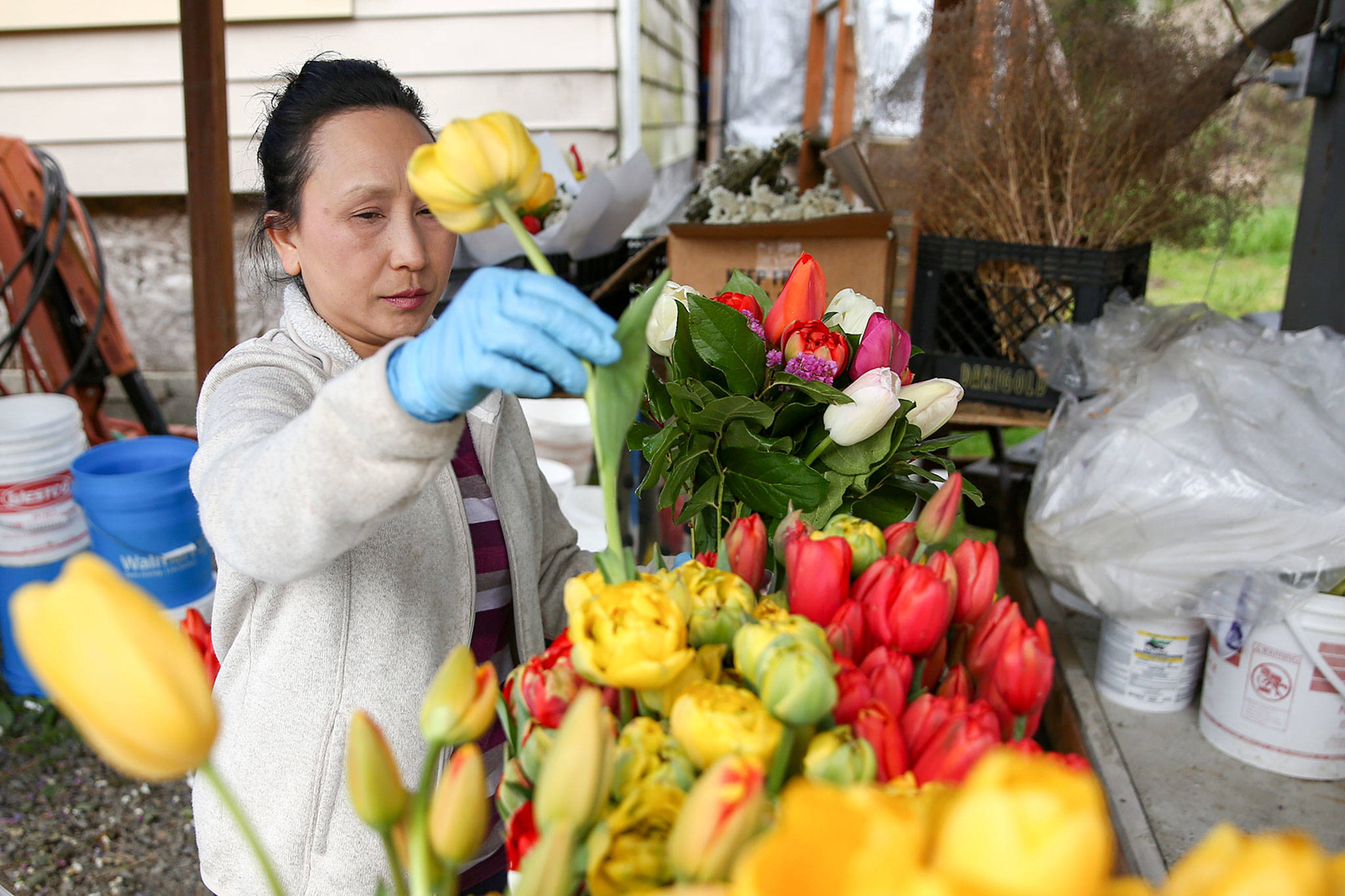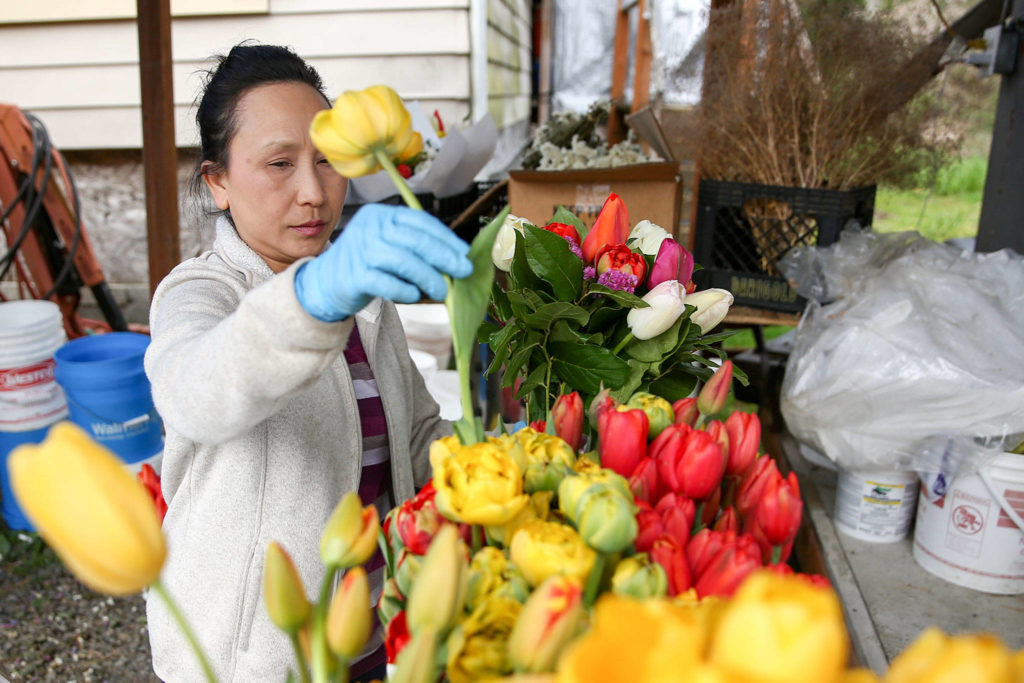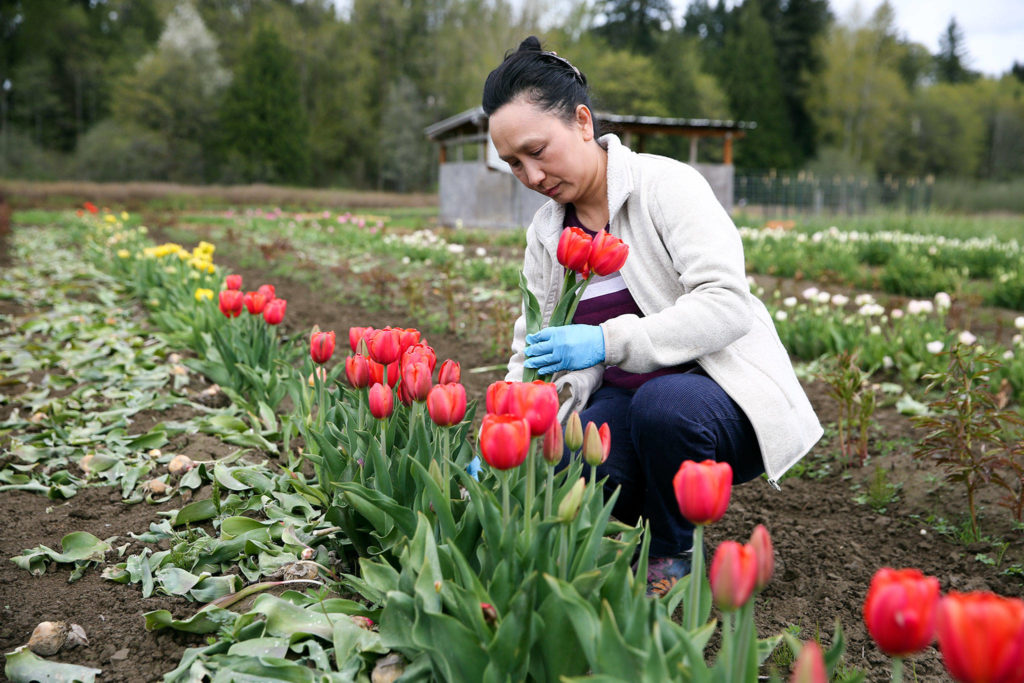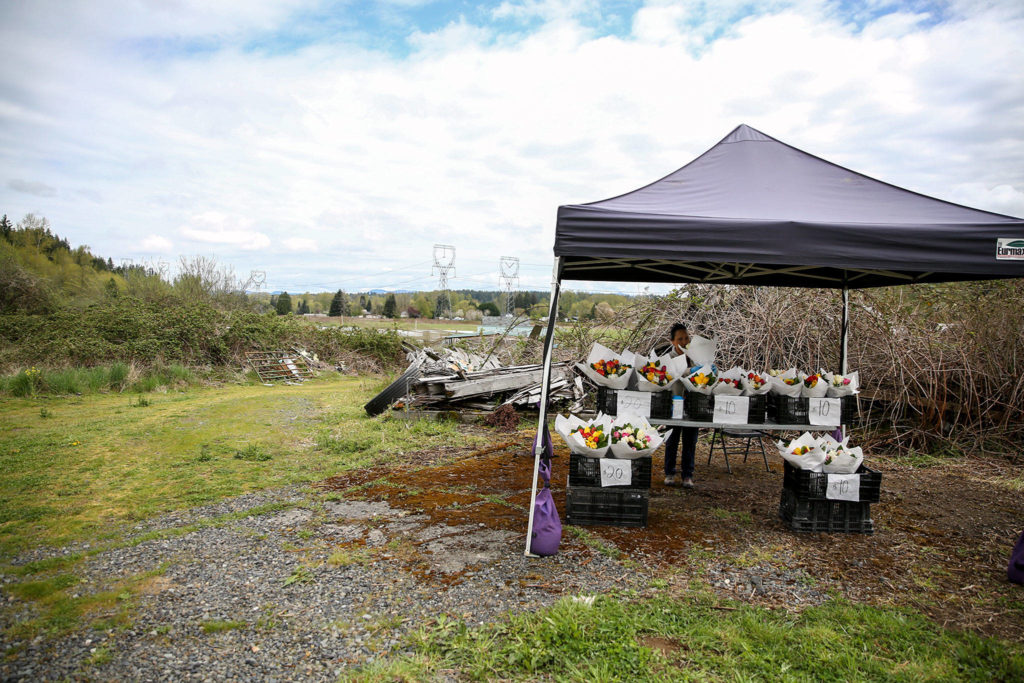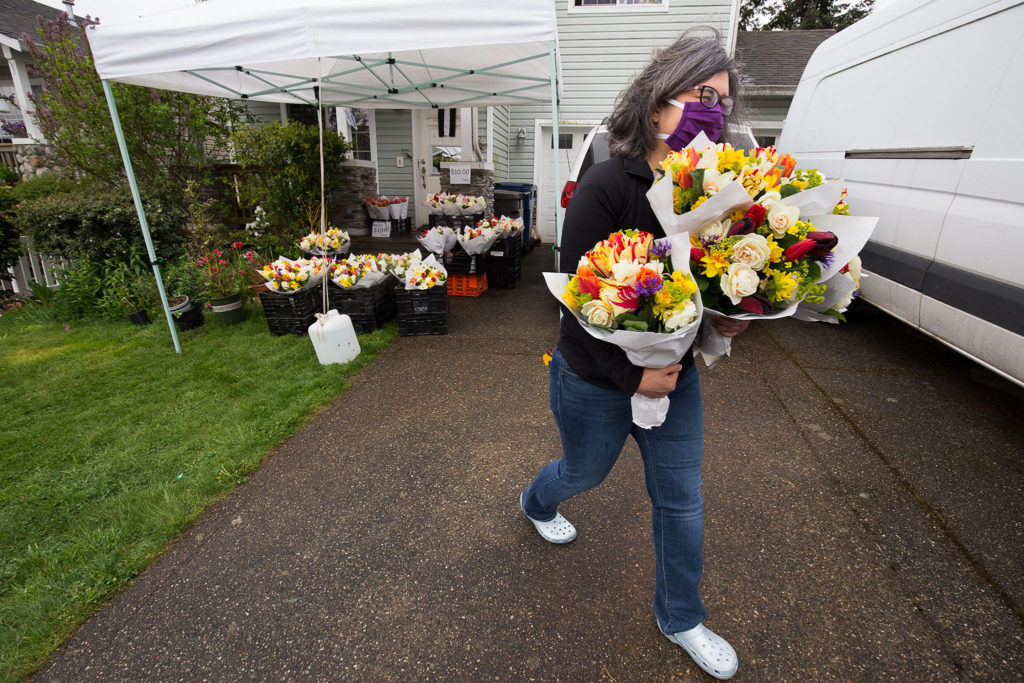SNOHOMISH — The formerly boisterous, meandering social scenes of farmers markets will become orderly, sanitized and socially distant as the season begins soon in Snohomish County.
Like almost everything else, it will feel and look strange compared to past years because of the coronavirus outbreak. Rules to help stem the spread of COVID-19 will exclude handmade goods deemed non-essential — candles, garden art, jewelry.
“When people think of a farmers market and a crowded area for a good time and a sandwich and a coffee, that’s not what’s happening here,” said Colleen Donovan, executive director of the Washington State Farmers Market Association, which has about 110 members.
Masks are encouraged for customers and vendors. Some markets will run as drive-thrus. Others will have new locations. Far fewer booths will be set up. Preorders are available and encouraged. There won’t be samples at markets in Arlington, Edmonds, Everett, Lake Stevens, Marysville, Mukilteo, Smokey Point, Snohomish or Stanwood.
Flowers are allowed, after the Snohomish Health District updated its guidelines in accordance with the state, which included floriculture as part of agriculture’s essential business.
The Smokey Point Market had 22 vendors signed up for its first day on Friday, May 1. That was before the governor’s stay-home order and closure of non-essential businesses. Now only nine booths are planned. They will sell CBD topical pain relief creams and lotions, coffee, garden and vegetable starts, jams and jellies, meats, produce and soaps.
“It’s heartbreaking,” said Jamie Williams, who organizes the markets in Smokey Point and Marysville, which are to open June 6 as the rebranded Farmers at Marysville Market.
Farmers markets may allow the sale of food, according to guidelines from the Snohomish Health District. That’s in line with Gov. Jay Inslee’s executive orders prohibiting operations deemed non-essential.
Such markets are an important source of fresh food for people who receive federal and state assistance.
In January, 796,876 people in the state used the Supplemental Nutrition Assistance Program, commonly called SNAP or food stamps, according to federal data. The U.S. Census Bureau estimated more than 29,000 people in Snohomish County used SNAP in 2018.
With unemployment skyrocketing as a result of business closures, those numbers are likely to rise this year.
The food assistance benefits can be matched and doubled at some farmers markets, stretching that money and funneling it to local agricultural.
No flowers?
While food is obviously essential, coronavirus-related rules exclude artists, crafters and others who depend on markets for income.
The Snohomish Farmers Market was prepared for its biggest opening in 29 years, with 80 vendors. Now, market manager Sarah Dylan Jensen said she expects closer to 50 on Thursday, May 7.
“Our market has grown exponentially each year, with the last two years being astronomical numbers I didn’t even believe until I checked my math,” she said.
Losing vendors mean less opportunity to make money. Jensen said she expects a 40% drop in sales from last year.
Flower vendors have been a major draw. They were initially prohibited, but eventually approved by the governor’s office and Washington State Department of Agriculture.
“Just thinking about the flower vendors, it’s a huge loss for them, especially since they lost Easter and Mother’s Day,” Donovan said.
Often flower farmers also grow other crops later in the season. But without money from flower sales, that second crop could have been in jeopardy.
“You need to have those sales to have the capital to invest in the next crop,” Donovan said.
The governor’s office said that flower farming is agriculture and thus essential. That prompted the Washington Department of Agriculture to publish guidance for the industry, which allows for flower sales.
But the Snohomish Health District’s guidelines for farmers markets, published April 17, listed flowers among prohibited services, citing state Department of Health guidance. It was updated Monday in line with the state’s list. The state health department guide, published April 21, did not specifically list flowers as allowed or excluded.
Teng’s Garden, a flower farm in Snohomish since 1999, was a regular at farmers markets in Edmonds, Everett and Snohomish, as well as Capitol Hill and Columbia City in Seattle. It exclusively sold bouquets at those seasonal, weekly events.
Phavana Chang, whose mom owns Teng’s Garden, said this year they’ve been selling $10 bouquets on weekends from their porch in south Everett.
“We’ve just been having our neighbors spread the word,” she said.
Sno Country Farm in Machias, another flower operation, made a similar changes to sell daffodils and tulips in bloom. Pa Lee, who has grown flowers for about a decade with her husband, Koua Lee, said they put up a stand on their farm.
But they want to sell at the markets again.
“We’re really hoping to be back by Mother’s Day week because we’ve planned this since October,” Chang said.
Reconfigured sales
The Everett Farmers Market will open this Sunday, May 3. That’s a week earlier than originally planned. Mother’s Day is the usual start date, but co-owner and manager Gary Purves said concerns about large crowds prompted them to start earlier.
“Mother’s Day has been a traditional event with thousands of people,” he said. “That’s not going to work for the city or anyone.”
About 20 vendors will be there, down from the usual 100 or so on opening day. There will be only drive-thru, pre-order pickups on Wetmore Avenue between Hewitt and Pacific avenues.
Eventually, they hope the market can resume the walk-up format. But that’s dependent on the governor’s orders and approval from the health district. Until then, customers are expected to order their farmers market food before and just show up to retrieve it.
Stoffel Farm’s pork will be at the Everett market. The Arlington family farmers sell bacon, bratwurst, pork chops, sausages and more. Their product supply was disrupted because of closures by the butchers they use.
“It’s been so confusing what to do,” said Dana Stoffel, the matriarch of the multigenerational farm family.
The butcher’s schedule has them set to be restocked around Memorial Day weekend, Stoffel said. To help cover the gap, they’ve promoted sales through a Facebook page and at roadside.
“You’ve gotta sell somewhere,” Stoffel said. “It’s kind of scary.”
Learning as they go
Farmers markets that open later in the season could benefit from the experience of the earlier ones.
Jensen said she hopes to apply what she learns at the Snohomish market to the new Lake Stevens market on Wednesdays from June 3 to Aug. 19 and the Stanwood market on Fridays from June 5 to Oct. 9.
Purves said he and co-owner Karen Erickson plan to operate a Wednesday market at Everett Station starting June 10.
The Edmonds Historical Museum Garden Market is scheduled for Saturday, May 9, with 10 farmers and 10 producers, which includes things like preservatives and pickled foods.
Expect crowd limits and lines to enter the area on Fifth Avenue North between Bell and Main streets. Instead of a free-flowing space, the Edmonds market will have a controlled entrance near Centennial Plaza, a one-way walking path through it and a controlled exit near the fountain.
The Arlington Farmers Market, put on by the Stilly Valley Chamber of Commerce, is set for Saturdays between June 6 and Labor Day weekend, Sept. 5.
“We are excited to regain some normalcy (safely) by supporting our local farming community during this time,” chamber executive director Mandy Kruger wrote in an email.
Location changes
Both the Smokey Point and Snohomish markets are changing locations from last year to help accommodate distancing requirements. Booths must be 10 feet apart, as required by the health district, in addition to allowing for space between customers.
Farmers markets must have hand-washing stations for customers, and each vendor must have one, as well. Those, along with signage and possible staffing increases for crowd management, are unexpected costs, Donovan said.
Smokey Point plans to line up vendors on the driver’s side of a one-way drive-thru, and customers will stay in their vehicles. That isn’t required, but it made sense to Williams and suits the parking lot at 14219 Smokey Point Blvd.
“They can drive, say, ‘Hey, I want four blueberry plants, I want four chickens,’ or whatever,” Williams said.
Prompted by the new spatial needs, Snohomish Farmers Market is leaving downtown and setting up at Stocker Farms at 8705 Marsh Road. The family farm signed a lease for $1 a month to let the farmers market move in, Jensen said. Next year, she plans to return to downtown Snohomish.
Donovan, Jensen and Williams each said they understand the need for such extensive rules — but wonder why they aren’t applied to grocery or hardware stores, where people can still buy candles, flowers and a host of things that would be inaccessible in boutiques.
“I would just like to see it be a blanket coverage, or let us do what we can do to protect our customers,” Jensen said.
It could be a rough time to launch a new market, which Jensen is doing in downtown Lake Stevens on Wednesday, June 3. The Lake Stevens Farmers Market will be at North Cove Park, 1806 Main St. She’s familiar with those challenges after taking over management of the Stanwood Farmers Market a year ago. It’s set to open Friday, June 5 at the parking lot at 8727 271st St. NW.
“This whole pandemic really goes against the DNA of how we operate as farmers markets,” said Donovan, executive director of the state association. “But it’s what we need to do. If we’re not safe, we can’t operate.”
Ben Watanabe: bwatanabe@heraldnet.com; 425-339-3037; Twitter @benwatanabe.
Editor’s note: The rules for flowers were clarified Monday by the Snohomish Health District, in line with the Governor’s Office and the Washington State Department of Agriculture, which confirmed floriculture as part of agriculture, an essential business.
Talk to us
> Give us your news tips.
> Send us a letter to the editor.
> More Herald contact information.
